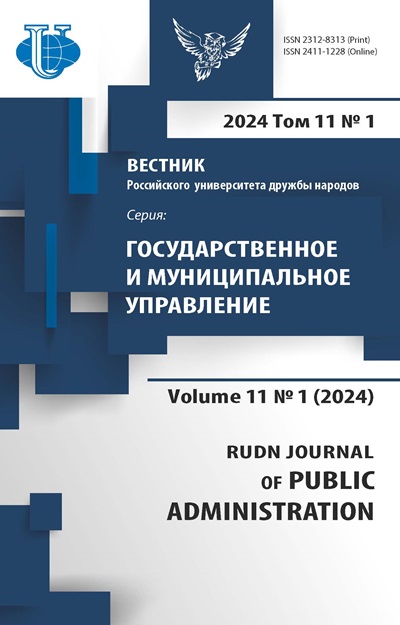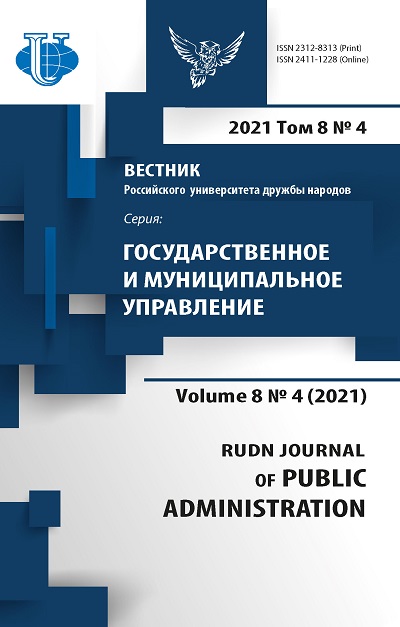The Image of the Ancient Jewish Ruler and Autocratic Power During the Formation of Statehood (Based on the Materials of the Hebrew Bible)
- Authors: Kovalev A.A.1
-
Affiliations:
- North-Western Institute of Management of the Russian Presidential Academy of National Economy and Public Administration
- Issue: Vol 8, No 4 (2021)
- Pages: 365-374
- Section: HISTORY OF PUBLIC ADMINISTRATION
- URL: https://journals.rudn.ru/public-administration/article/view/29645
- DOI: https://doi.org/10.22363/2312-8313-2021-8-4-365-374
Cite item
Full Text
Abstract
The relevance of the study lies in the fact that the ancient texts of the Hebrew Bible largely anticipated the political and legal achievements of the last centuries. The Tanakh, additions and commentaries to it determine the direction of modern international humanitarian law, ways of forming state administration, lay the foundations of a system of checks and balances, a system of separation of powers, contain the foundations of the contractual theory of the origin of the state by concluding an agreement between the people and the king. The purpose of this study is to analyze the ancient texts of the Hebrew Bible and update the obtained data in modern political and managerial relations. Some texts of the Hebrew Bible (Tanakh), authoritative commentaries on them and the results of research by domestic and foreign scientists were used as materials for the study. The research methods were comparison, analysis of documents, and the system method. The conducted research concluded that doubts about the historicity and practical reliability of the texts of the Hebrew Bible are not able to affect the indisputable value of the material contained in it. Even if the events described have never taken place in history, the views expressed in the Bible themselves should be recognized as far ahead of their time and of value for modern political science. The Hebrew Bible defines the representative of the autocratic power (the king) as “the first among equals”. This applies to rights, duties, and responsibilities. It is this postulate that should be embedded in the modern political and managerial system, in which there is always a manager and performers. And only continuous work (primarily on oneself), self-improvement, as the Hebrew Bible bequeathed, should become the criterion for selecting a leader, and not any preferences.
About the authors
Andrey A. Kovalev
North-Western Institute of Management of the Russian Presidential Academy of National Economy and Public Administration
Author for correspondence.
Email: kovalev-aa@ranepa.ru
ORCID iD: 0000-0002-7760-5732
Candidate of Political Sciences, Associate Professor of the Department of State and Municipal Administration
57/43, Sredny ave. V.O., St. Petersburg, Russia, 199178References
- Dietrich W. The Early Monarchy in Israel: The Tenth Century B.C.E. Atlanta: Society of Biblical Literature; 2007.
- Gorohov V. Problema formirovanija politicheskogo instituta monarhii v Drevnem Izraile (po dannym sovremennoj zarubezhnoj istoriografii) [The Problem of the Formation of the Political Institution of the Monarchy in Ancient Israel (According to Modern Foreign Historiography)]. Hristianskoe chtenie. 2012;1:161–172 (In Russ.).
- Dever W.G. Histories and Non-Histories of Ancient Israel: What Archaeology Can Contribute. Recent Trends in Reconstructing the History of Ancient Israel (Rome, Accademia Nazionale dei Lincei, March 6–7, 2003). URL: http://www.vho.org/aaargh/ fran/livres10/Recenttrends.pdf. Accessed: 04.07.2021.
- Bright J. History of Israel. Philadelphia: Westminster; 1981.
- Vaux R. de. Les institutions de l’Ancien Testament. Paris: Ed. du Cerf, 1961. (In French).
- Gottwald N.K. The Tribes of Yahweh: A Sociology of the Religion of Liberated Israel 1250–1050 B.C.E. N.Y.: Orbis Books; 1979.
- Noth M. Das System der zwӧlf Stӓmme Israels. Stuttgart: W. Kohlhammer; 1930. (In Germ.).
- Rajt Dzh.Je. Biblejskaja arheologija [Biblical Archeology]. Saint Petersburg: O. Abyshko; 2003 (In Russ.).
- Rush M.D. Management: A Biblical Approach. Colorado Springs: David C Cook; 2002.
- Gorohov A.A. Osobennosti vneshnej politiki carej Davida i Solomona v Drevnem Izraile [Features of the Foreign Policy of Kings David and Solomon in Ancient Israel]. Izvestija Altajskogo gosudarstvennogo universiteta. 2014;4–1(84):69–73 (In Russ.).
- Kalinina E.V. Vethozavetnoe i talmudicheskoe uchenie o dopustimosti primenenija nasilija v mezhgosudarstvennyh otnoshenijah. Koncepcija vojny [Old Testament and Talmudic Teaching on the Permissibility of the Use of Violence in Interstate Relations. The Concept of War]. Vestnik Nizhegorodskogo universiteta im. N.I. Lobachevskogo. 2017;6:99–103 (In Russ.).
- Kalinina E.V. Drevnejshaja istorija mezhdunarodnogo prava: vethozavetnaja i talmudicheskaja koncepcija vojny i mira i osnov gumanitarnogo prava [The Ancient History of International Law: The Old Testament and Talmudic Concept of War and Peace and the Foundations of Humanitarian Law]. Vestnik MGLU. Obrazovanie i pedagogicheskie nauki. 2017;6(785):209–217 (In Russ.).
- Kalinina E.V. Specifika drevneevrejskogo predstavlenija o pravovom polozhenii glavy gosudarstva i ob ideal’noj forme pravlenija, nashedshego otrazhenie v Pjatiknizhii i Talmude [Specificity of the Hebrew Idea of the Legal Position of the Head of State and the Ideal Form of Government, Reflected in the Pentateuch and Talmud]. Vestnik Nizhegorodskogo universiteta im. N.I. Lobachevskogo. 2007;2:244–247 (In Russ.).
- Frick F.S. The Formation of the State in Ancient Israel. Sheffield: JSOT Press; 1985.
- Thompson L.T. Early History of the Israelite People from the Written & Archaeological Sources. Leiden: E. J. Brill; 1990.
- Gorohov A.A. Osnovnye tendencii razvitija obshhinno-chastnogo hozjajstva u drevnih evreev v period pravlenija Davida i Solomona (X v. do n.je.) [The Main Trends in the Development of Communal-private Economy among the Ancient Jews during the Reign of David and Solomon (X century BC)]. Problemy istorii, filologii, kul’tury. 2013;3(41):54–63 (In Russ.).
- Schafer-Lichtenberger C. Sociological and Biblical Views of the Early State. The Origins of the Ancient Israelite States. Ed. by V. Fritz and P.R. Davies (JSOT Series). Sheffield Academic Press; 1996.
- Elazar D.J. Exploring Federalism. Tuscaloosa; London: University of Alabama Press; 1987.
- Barton J. The Hebrew Bible: A Critical Companion. Princeton University Press; 2016.
- Davies E.W. Narrative Ethics in the Hebrew Bible: Moral Dilemmas in the Story of King David. T&T Clark; 2021.
- Collins J.J. Introduction to the Hebrew Bible. Minneapolis: Fortress Press; 2014.
- Dashevskij Z. Lekcii po Tore [Tore Lectures on Torah]. Mahanaim. URL: http://machanaim.org/ tanach/in_dt.htm. Accessed: 03.07.2021.
- Gerc J.C. Tora. Pjatiknizhie i gaftarot [Torah. The Pentateuch and the Haftarot]. Moscow: Gesharim; 1999 (In Russ.).
- Alter R. The Hebrew Bible: A Translation with Commentary. N.Y.: W.W. Norton & Company; 2018.
- Sifuna-Evelia M. Human Resource Management Practices: A Biblical Perspective. Singapore: Partridge Publishing; 2017.
- Fewell D.N. The Oxford Handbook of Biblical Narrative. Oxford University Press; 2016.
















